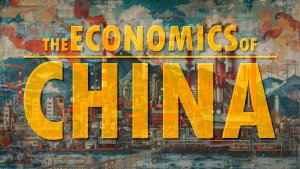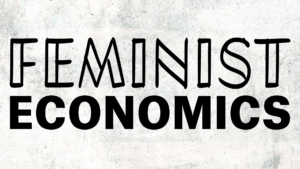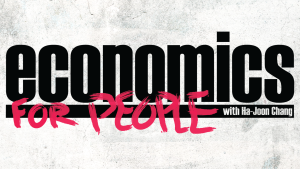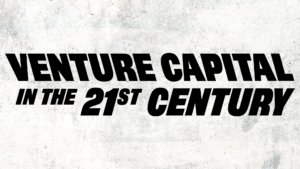As data, intellectual property, and intangible assets eclipse physical capital, how do we ensure that policy, society, and institutions keep pace?
In this series, renowned economist Rohinton Medhora guides us through the fundamental shifts redefining value, labor, governance, and global cooperation in the 21st century. The Invisible Economy offers an essential roadmap for navigating the world we’re already living in—and the one that’s rapidly unfolding.
EPISODE 1
What’s the Problem?
The economy has changed. Have we caught up?
From smartphones to AI patents, we are living through an economic transformation where value is increasingly invisible—embedded in code, algorithms, and intellectual property. In this opening episode, Rohinton Medhora dissects how intangibles are reshaping global wealth and why current tools in economics and policymaking may be falling dangerously behind.
Suggested Reading List
| The Unbound Prometheus David Landes, CUP 1969 and 2014 | 2:03 | ||
| Prometheus Unbound Shelley Percy, Reading by Ralph Cotterill | 2:03 | ||
| The incorporation of structural change into growth theory: A historical appraisal Francisco Adilson Gabardo, João Basilio Pereima, Pedro Einloft, ScienceDirect | 2:58 | ||
| Conditions of Economic Progress Colin Clark, Macmillan1940, The Economic Journal, Oxford Academic | 2:58 | ||
| Quantitative Aspects of the Economic Growth of Nations: II. Industrial Distribution of National Product and Labor Force Simon Kuznets, 1957, Economic Development and Cultural Change: Vol 5, No S4 | 2:58 | ||
| Patterns of Development 1950-70 Hollis Chenery and Moises Syrquin, The World Bank 1975 | 2:58 | ||
| Capitalism Without Capital Jonathan Haskel and Stian Westlake, Princeton University Press, 2018, Chapter 3. | 4:16 | ||
| Intangible Capital in Global Value Chains World Intellectual Property Organization, World Intellectual Property Report 2017, Chapter 4 | 6:33 | ||
| Intangible Asset Market Value Study Ocean Tomo, 2022 | 8:30 | ||
| Intellectual Property and Artificial Intelligence: What Does the Future Hold? Peter Cowan and Jim Hinton, IAM media, February 2018 | 9:55 | ||
| The Geopolitics of AI: How Nations are Competing for AI Dominance Adam MacKay | 9:55 | ||
| Arms Race or Innovation Race? Geopolitical AI Development Schmid, S., Lambach, D., Diehl, C., & Reuter, C., Geopolitics, January 2025 | 9:55 | ||
| Capitalism Without Capital Jonathan Haskel and Stian Westlake, Princeton University Press, 2018, Chapter 3 | 11:50 | ||
| Global Standards for Digital Cooperation Michel Girard, Centre for International Governance Innovation (CIGI) 2019 | 15:42 | ||
| Why the Data Economy Needs Standards to Thrive Michel Girard, Centre for International Governance Innovation (CIGI) 2019 | 15:42 | ||
| Dynabench | 16:25 | ||
| The brief history of artificial intelligence: the world has changed fast — what might be next? Our World in Data | 16:25 | ||
| Innovation and the State: Political Choice and Strategies for Growth in Israel, Taiwan, and Ireland Dan Breznitz, Yale University Press, 2011 | 17:33 | ||
EPISODE 2
What Can Policy Do?
Policy isn't powerless—if it learns to adapt.
Can public policy keep up with a world defined by intellectual property, data trusts, and fast-moving innovation? Episode 2 dives deep into the levers governments still hold—from procurement to patent collectives—and how they can be repurposed for a new era. With real-world examples from Japan to Switzerland, this episode maps out what a smarter, more proactive state can look like.
Suggested Reading List
New Thinking on Innovation | 0:45 | ||
| Enhancing the Commercialization of University Research Maxwell, A. (2023). In: Patnaik, S., Pallotta, V., Tajeddini, K. (eds) Global Trends in Technology Startup Project Development and Management. Innovation, Technology, and Knowledge Management. Springer, Cham. | 2:50 | ||
| Reclaiming Data Trusts Sean Martin McDonald, Centre for International Governance Innovation (CIGI) 2019 | 7:03 | ||
| Apply new AI governance regimes to health first to test their benefits Anurag Agrawal and Rohinton Medhora, DTHL Working Paper 2024 | 7:45 | ||
| CGIAR at 50 CGIAR | 8:15 | ||
| Understanding Open Science UNESCO Digital Library, 2022. | 9:45 | ||
| AI Nationalism Ian Hogarth | 11:45 | ||
| Capitalism Without Capital Jonathan Haskel and Stian Westlake, Princeton University Press, 2018, Chapter 8 | 13:35 | ||
| The War on Normal People Andrew Yang, Hachette Books, 2018. | 17:00 | ||
| A New Kind of Job Market TED Talk | 21:20 | ||
| Modern Markets For all Wingham Rowan, Centre for International Governance Innovation (CIGI) 2021 | 21:20 | ||
| Should Gig Work Be Government-Run? Nick Romeo, The New Yorker, March 2021 | 21:45 | ||
EPISODE 3
Implications for Government
Can our institutions catch up with our technology?
Governance in the digital age needs a reboot. What does effective governance look like in an age of black-box algorithms, borderless data, and rapid innovation? In this concluding episode, Rohinton Medhora examines how governments must rethink their role—not only in regulating monopolies or shaping markets, but in safeguarding human rights, fostering global cooperation, and building institutions fit for the intangible era. From digital charters to algorithmic accountability and the need for a "Digital Stability Board," this episode explores bold ideas for restoring agency, equity, and foresight in governance.
Suggested Reading List
A Post-COVID-19 Digital Bretton Woods | 1:30 | ||
| The Sixth IMF Statistical Forum: Keynote Speech by Jim Balsillie Jim Balsillie, Chair of the Centre for International Governance Innovation, IMF Videos, Nov 2018 | 1:30 | ||
| Universal Declaration of Human Rights United Nations | 2:25 | ||
| How Do We Liberate Our Minds for the Freedom to Think? Susie Alegre, Bristol Ideas, September 2022 | 3:15 | ||
| Can we ever kick our smartphone addiction? Jim Balsillie and Norman Doidge, Globe and Mail | 3:15 | ||
| USMCA May Have Closed the Door on Data Localization Too Soon Jesse Hirsh, Centre for International Governance Innovation (CIGI), October 26, 2018 | 3:40 | ||
| Digital Taxation Around the World Tax Foundation | 7:20 | ||
| Restoring Public Good — Now and for the Future Rob Johnson and Rohinton Medhora, Centre for International Governance Innovation (CIGI), May 5, 2021. | 9:20 | ||
| A Model for Global Governance of Platforms Robert Fay, in Regulating Big Tech: Policy Responses to Digital Dominance, Martin Moore and Damian Tambini, eds, Oxford University Press, 2021 | 10:00 | ||















